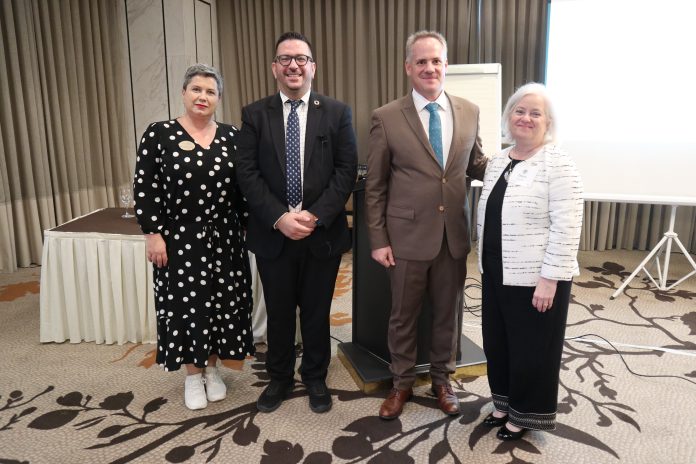Aleksandra Popovski and Debra Suarez discuss the ELT profession and teachers associations at IPE Athens.
Back in September, EL Gazette attended the International Publishers Exhibition (IPE), the biggest Foreign Language Teaching (FLT) materials exhibition in Greece and Cyprus.
As they celebrate 40 years of FLT promotion, Athens’ Autumn IPE was bursting with game-changers and innovators in the ELT sector, and hosted a cornucopia of publishers, exam boards and stakeholders.
What stood out at IPE was the way the event puts teachers first; IPE is free to attend, making it accessible to anyone looking for a chance to speak with some of the biggest names in ELT publishing with a chance to attend inspiring talks and presentations from international speakers.
The highlight of Athens’ Autumn IPE was the first evening’s round table discussion, ‘The Future of English Language & The Sustainability of Teachers Associations’, featuring key speakers Aleksandra Popovski, President of IATEFL, and Debra Suarez, President of TESOL International. Moderating the talk was George Kormpas, President of TESOL Gulf.
Where do we go from here?
The discussion kicked off with the question of emerging trends in the ELT profession. Perhaps unsurprisingly, a common thread was Artificial Intelligence, however, the overall tone was more hopeful and understanding than negative.
Debra, on the topic of professional development in technology, suggested we desperately need to address teachers’ confidence with, and willingness to use, AI:
‘We are the ones creating the field of ELT,’ she said. ‘AI is not something that is happening to us, but it is something that we are creating, and it starts with confidence.’
Aleksandra, adding on to educators’ experiences with AI, also urged for teachers to talk more openly about the technology, what it is, its ethical issues, and how to use it properly and effectively.
‘Nobody talks about teachers’ and students’ AI literacy,’ she said. ‘Why are we using AI tools? What is the purpose of AI in education? We are no longer dealing with traditional literacy, but also digital and multi-modal literacy.’
While discussing trends, Debra and Aleksandra also brushed on globalisation, talking about it in more detail as the speakers were asked about Global Citizenship. Aleksandra spoke candidly, touching on her experiences growing up.
‘As a refugee, my language of communication was English,’ she said. ‘It opened doors for me and was the only way I could make friends and get an education. English saved me.’
Aleksandra went on, describing English as a valuable tool that can knock down borders, both physically and educationally. It can foster understanding, empathy and humility as a bridge between different cultures, customs and languages. She concluded by pointing out that, in a room full of people of various nationalities, English was what connected them all in that moment.
From the other perspective, Debra talked about focussing on ‘decolonising’ and creating ‘cultural humility’ with global citizenship.
‘We can’t talk about globalisation without also elevating the local context,’ she said. ‘Globalisation could be seen as a linguistic, imperialist spread of English. So, how can we take pedagogies and methodologies brought in from other areas and make them our own based on our students’ needs?’
Debra suggests starting from within our own classrooms. She says teachers can show students that global citizenship is how we are as individuals with the rest of the world, rather than imposing ourselves on others.
Expanding upon experiences in the classroom, Aleksandra and Debra also broached the subject of challenges facing teachers in today’s world, including teacher wellbeing and working conditions.
Both speakers agreed teachers are unappreciated and unsupported, needing more than just a ‘lit candle and a yoga mat’ to address declining morale and mental health. They also agreed teachers need more support when seeking professional development, allowing them the room to grow and improve.
Support for educators could also come from teaching associations; as presidents of IATEFL and TESOL International, Aleksandra and Debra moved the topic on to maintaining members and engagement in teaching associations. They both agreed that the longevity of associations comes from listening to its members and maintaining a strong leadership.
‘Associations are made up of all of us,’ said Debra. ‘We get community, we get advocacy; we are no longer just one voice, but hundreds and thousands of voices.’
Aleksandra added: ‘We are bringing all of these teachers together from different parts of the world. It is very important to understand that associations can do so much because of the power that we all bring to the community.’
The round table discussion concluded with reluctance, the room clearly entranced by the expertise of the speakers and ready to hear more. If not for time constraints, it was clear Aleksandra, Debra and the audience could have talked, with passion, for many more hours.
As the audience made their way from the room—some sticking behind to talk more with Debra and Aleksandra—there was a real feeling that everyone walked away with something to ruminate on, and more knowledge to bring back to their students or institutions.
Although IPE is now finished, running a total of six events in Greece, Cyprus and Albania this year alone, the Athens’ event has left its guests and the Gazette ready and waiting for what might be coming in 2025.





